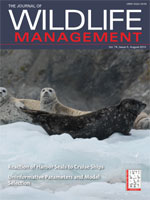Animal locations estimated by Global Positioning System (GPS) inherently contain errors. Screening procedures used to remove large positional errors often trade data accuracy for data loss. We developed a simple screening method that identifies locations arising from unrealistic movement patterns. When applied to a large data set of moose (Alces alces) locations, our method identified virtually all known errors with minimal loss of data. Thus, our method for screening GPS data improves the quality of data sets and increases the value of such data for research and management.
BioOne.org will be down briefly for maintenance on 13 August 2025 between 18:00-21:00 Pacific Time US. We apologize for any inconvenience.
How to translate text using browser tools
1 August 2010
Screening Global Positioning System Location Data for Errors Using Animal Movement Characteristics
Kari Bjørneraas,
Bram Van Moorter,
Christer Moe Rolandsen,
Ivar Herfindal
ACCESS THE FULL ARTICLE
It is not available for individual sale.
This article is only available to subscribers.
It is not available for individual sale.
It is not available for individual sale.

Journal of Wildlife Management
Vol. 74 • No. 6
August 2010
Vol. 74 • No. 6
August 2010
Alces alces
data screening
global positioning system
location accuracy
location error
moose
movement behavior




